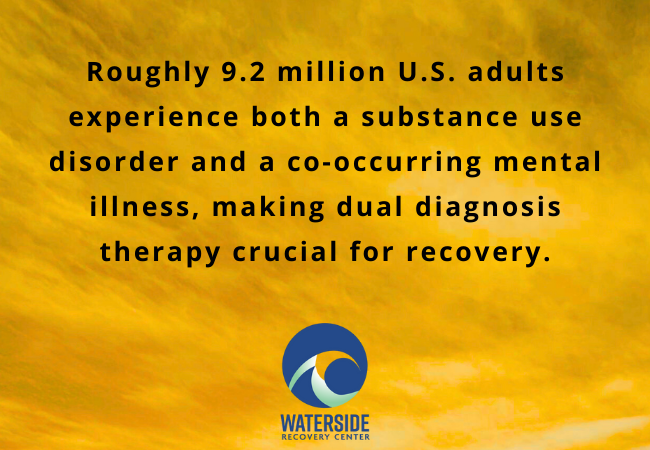Overcoming alcohol addiction is not simply about quitting drinking—it’s about learning how to live again. At Waterside Recovery, we understand that recovery is an emotional, mental, and behavioral transformation. That’s why therapy and counseling are at the heart of every effective Alcohol Addiction Treatment Program in Massachusetts we offer.
Whether you’re enrolled in our Day Treatment Program, Afternoon Treatment Program, or stepping down into an Outpatient Treatment Program, therapy plays a vital role in helping individuals rebuild their lives after addiction.
Why Therapy Is Crucial in Alcohol Addiction Treatment
Alcohol addiction often stems from deeper issues—trauma, stress, mental health disorders, or coping mechanisms developed over time. Therapy does more than address the drinking—it helps heal the person behind the behavior.
Here’s what therapy accomplishes:
- Identifies and treats the root causes of addiction
- Helps clients develop healthy coping strategies
- Teaches relapse prevention and emotional regulation
- Encourages accountability and personal growth
- Rebuilds damaged relationships and self-worth
At our Massachusetts Addiction Treatment Center, therapy is the cornerstone of sustainable recovery.
Individual Therapy: Personalizing the Healing Process
Every individual’s journey with alcohol addiction is unique. One-on-one therapy provides a private, supportive space to explore:
- Underlying emotional pain or trauma
- Co-occurring mental health conditions (depression, anxiety, PTSD)
- Negative thought patterns and behaviors
- Triggers and high-risk situations
We utilize evidence-based approaches such as:
- Cognitive Behavioral Therapy (CBT): Helps individuals change negative thinking and behavioral patterns.
- Motivational Interviewing (MI): Strengthens internal motivation to change.
- Trauma-Informed Therapy: Supports healing from past abuse or unresolved pain.
This personalized approach makes a profound difference in our Alcohol Addiction Treatment Program in Massachusetts.
Group Counseling: Shared Healing Through Connection
Group therapy is a powerful tool that fosters empathy, understanding, and community. In our Day and Afternoon Treatment Programs in Massachusetts, clients regularly participate in facilitated groups that focus on:
- Relapse prevention skills
- Peer support and shared experiences
- Managing emotions in recovery
- Building healthy relationships
- Communication skills
Hearing others’ stories often helps clients break out of the isolation of addiction and discover they are not alone.
Family Therapy: Rebuilding Bonds Damaged by Addiction
Alcohol misuse strains families—trust is broken, boundaries are blurred, and emotions run high. Family counseling helps everyone heal by:
- Addressing dysfunction or codependency
- Improving communication and trust
- Educating loved ones about addiction
- Establishing boundaries and expectations
Family involvement dramatically improves long-term outcomes and gives clients a support network at home.
Dual Diagnosis Therapy: Treating Addiction and Mental Health Together
It’s common for those with alcohol addiction to also suffer from mental health issues. At our Addiction Treatment Center in Massachusetts, we specialize in dual diagnosis care that integrates therapy for both conditions.
This includes treating:
- Anxiety disorders
- Depression
- Bipolar disorder
- PTSD
- OCD
Therapy helps stabilize mood, manage symptoms, and reduce the risk of relapse triggered by untreated mental health issues.
Relapse Prevention Therapy: Planning for Long-Term Sobriety
Therapy in alcohol addiction treatment also includes a strong focus on relapse prevention. Clients work with their therapists to develop:
- Personalized relapse prevention plans
- Strategies for identifying and managing triggers
- Healthy alternatives for coping with stress
- Emergency support plans
This ongoing work is crucial during transition stages, especially when moving from a Day Treatment Program to an Outpatient Treatment Program in Massachusetts.
Holistic and Life Skills Counseling: Supporting the Whole Person
At Waterside Recovery, we know recovery is about more than sobriety—it’s about rebuilding a fulfilling life. That’s why our counseling also covers:
- Life skills coaching: budgeting, time management, healthy routines
- Mindfulness and meditation therapy: to reduce stress and promote emotional balance
- Vocational and career guidance: helping clients re-enter the workforce
- Nutrition and wellness support: physical health impacts mental health
These services support clients in creating a life that makes staying sober worth it.
How Therapy Differs Across Levels of Care
| Program | Therapy Intensity | Best For |
|---|---|---|
| Day Treatment Program | Full-time, 5-6 hours/day | Those needing structured recovery without overnight stays |
| Afternoon Treatment Program | Part-time, typically 3-4 hours/day | Clients with flexible daytime commitments or returning to work/school |
| Outpatient Treatment Program | 1-3 sessions/week | Ideal for maintenance therapy and continued support |
Each level ensures continuity of care with adaptable therapy based on progress.
The Benefits of Ongoing Therapy After Initial Recovery
Recovery doesn’t end after detox or rehab. In fact, continuing therapy through outpatient programs is one of the most effective ways to prevent relapse and maintain emotional stability.
Ongoing counseling helps clients:
- Navigate new life challenges
- Manage relationships and responsibilities in sobriety
- Stay grounded and accountable
- Reinforce relapse prevention strategies
That’s why Waterside Recovery offers flexible therapy options in our Outpatient Treatment Program Massachusetts for alumni and ongoing support.
Here are new, detailed sections to expand your blog on “How Therapy and Counseling Enhance Alcohol Addiction Recovery” for Waterside Recovery, bringing the word count above 2,000 and reinforcing both SEO and authority:
The Emotional Toll of Alcohol Addiction—and Why Therapy Is Vital
Alcohol misuse affects more than the body—it deeply impacts the mind and emotions. Many clients report:
- Chronic guilt and shame
- Loss of identity or purpose
- Emotional numbness or mood swings
- Struggles with anger, anxiety, or grief
Therapy allows individuals to confront these emotional wounds in a safe space. Clients learn how to:
- Rebuild self-esteem
- Express emotions constructively
- Replace shame with self-compassion
- Reconnect with a sense of identity beyond addiction
Without addressing these emotional layers, long-term sobriety becomes far more difficult. Our therapists help you understand your emotions rather than avoid them—making healing truly possible.
How Therapy Supports Medical Detox and Medication Management
For many clients, alcohol addiction recovery begins with medical detox. While this is crucial for safety, therapy is what helps clients stay sober once withdrawal symptoms subside.
In our Alcohol Addiction Treatment Program in Massachusetts, therapy works alongside medical support to provide:
- Education about how alcohol affects the brain and body
- Counseling to manage fear or trauma associated with detox
- Medication-assisted treatment (MAT) integration for relapse prevention (e.g., naltrexone, acamprosate)
- Support for managing cravings in real time
This combination of medical support and psychological therapy lays a stronger foundation for lifelong recovery.
The Role of Psychoeducation in Alcohol Addiction Recovery
Knowledge is power—especially in recovery.
Therapy sessions at Waterside Recovery include psychoeducation to help clients better understand:
- The cycle of addiction and relapse
- The effects of alcohol on the brain and behavior
- The connection between thoughts, feelings, and actions
- The science of triggers and cravings
When clients understand the “why” behind their behavior, they are empowered to take control of it. Psychoeducation builds motivation and strengthens decision-making throughout recovery.

How Therapy Reinforces Accountability and Structure
In the chaos of addiction, structure often disappears. Therapy helps reintroduce it—both emotionally and behaviorally.
During treatment, clients develop a predictable routine that includes:
- Scheduled therapy sessions
- Daily goal-setting and journaling
- Progress reviews with their therapist
- Check-ins on coping strategies and relapse risks
This level of accountability is essential for early recovery, especially in the transition from inpatient care or detox to a Day or Afternoon Treatment Program in Massachusetts.
Structure provides a sense of normalcy, predictability, and personal ownership that sustains recovery momentum.
Preparing for Life After Treatment—The Role of Aftercare Counseling
Recovery doesn’t end at discharge. That’s why therapy includes preparing for the real world—where triggers, stressors, and life challenges reappear.
Our Massachusetts Addiction Treatment Center provides dedicated aftercare planning therapy, which covers:
- Creating a personalized support plan
- Finding community resources (AA/SMART Recovery)
- Setting realistic long-term goals
- Identifying warning signs of relapse
- Reconnecting with purpose through work, hobbies, or service
Many clients continue attending our Outpatient Treatment Program in Massachusetts for ongoing therapy and support. This bridge between treatment and daily life dramatically reduces relapse risk and increases emotional resilience.
Real Recovery Stories Begin with Therapy
Many clients who walk through our doors feel overwhelmed, ashamed, and unsure of where to begin. Through consistent counseling and compassionate guidance, they gain clarity, purpose, and confidence.
Therapy gives alcohol addiction recovery a structure, a direction, and most importantly—a voice.
From processing trauma to rebuilding relationships, therapy is what makes recovery personal and sustainable.
Why Choose Waterside Recovery?
At Waterside Recovery, our licensed therapists and counselors are not just trained professionals—they’re compassionate partners in your journey. Our Massachusetts Addiction Treatment Center offers:
- Evidence-based therapies tailored to you
- Dual diagnosis expertise
- Trauma-informed care
- Flexible scheduling with Afternoon Treatment Program in Massachusetts
- A community that supports every step of your recovery
We don’t just help you get sober—we help you stay sober, thrive, and feel whole again.
Take the First Step Toward Healing
If you or a loved one is struggling with alcohol addiction, don’t wait. Recovery begins the moment you ask for help—and therapy can be the most powerful tool in that journey.
Call 866.671.8620 today to speak with our admissions team. Let us guide you into a program that supports your healing, honors your story, and helps you build a future without alcohol. Your recovery is possible—with the right therapy and the right team behind you.
FAQ on Alcohol Addiction Counseling
Why is therapy important in alcohol addiction recovery?
Therapy helps individuals understand the underlying causes of addiction, develop coping strategies, address trauma, and prevent relapse. It offers the emotional and psychological tools needed for long-term sobriety.
What types of therapy are offered at Waterside Recovery?
We offer individual therapy, group counseling, family therapy, trauma-informed therapy, and dual diagnosis treatment using CBT, DBT, motivational interviewing, and more.
How does family therapy support recovery?
Family therapy helps rebuild trust, resolve past conflicts, and educate loved ones on how to support recovery. It strengthens the entire support system, which improves long-term outcomes.
What is the difference between your Day and Afternoon Treatment Programs?
Our Day Treatment Program offers full-time therapy (5–6 hours daily), while our Afternoon Treatment Program provides part-time care (3–4 hours), perfect for clients balancing recovery with work, school, or family.
Does Waterside Recovery treat co-occurring mental health conditions?
Yes. Our dual diagnosis program addresses mental health issues like depression, anxiety, PTSD, and more alongside alcohol addiction, ensuring comprehensive care.
What happens after the main treatment program ends?
We offer aftercare counseling and Outpatient Treatment Programs in Massachusetts to provide continued support, therapy, and relapse prevention after PHP or IOP ends.
Can therapy continue after I complete detox or rehab elsewhere?
Absolutely. We welcome clients transitioning from other programs who want ongoing therapy, structure, or support through our outpatient or afternoon options.


